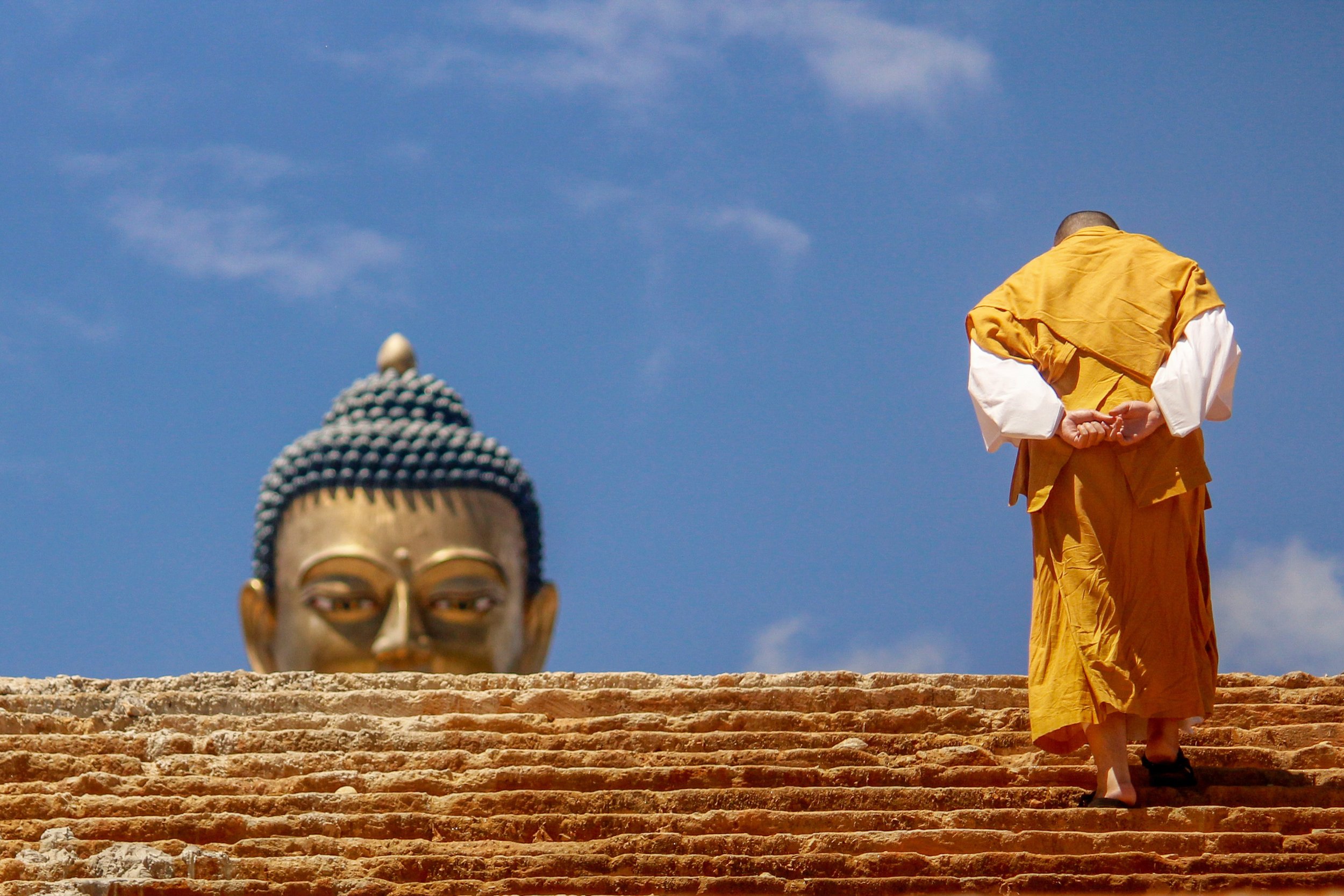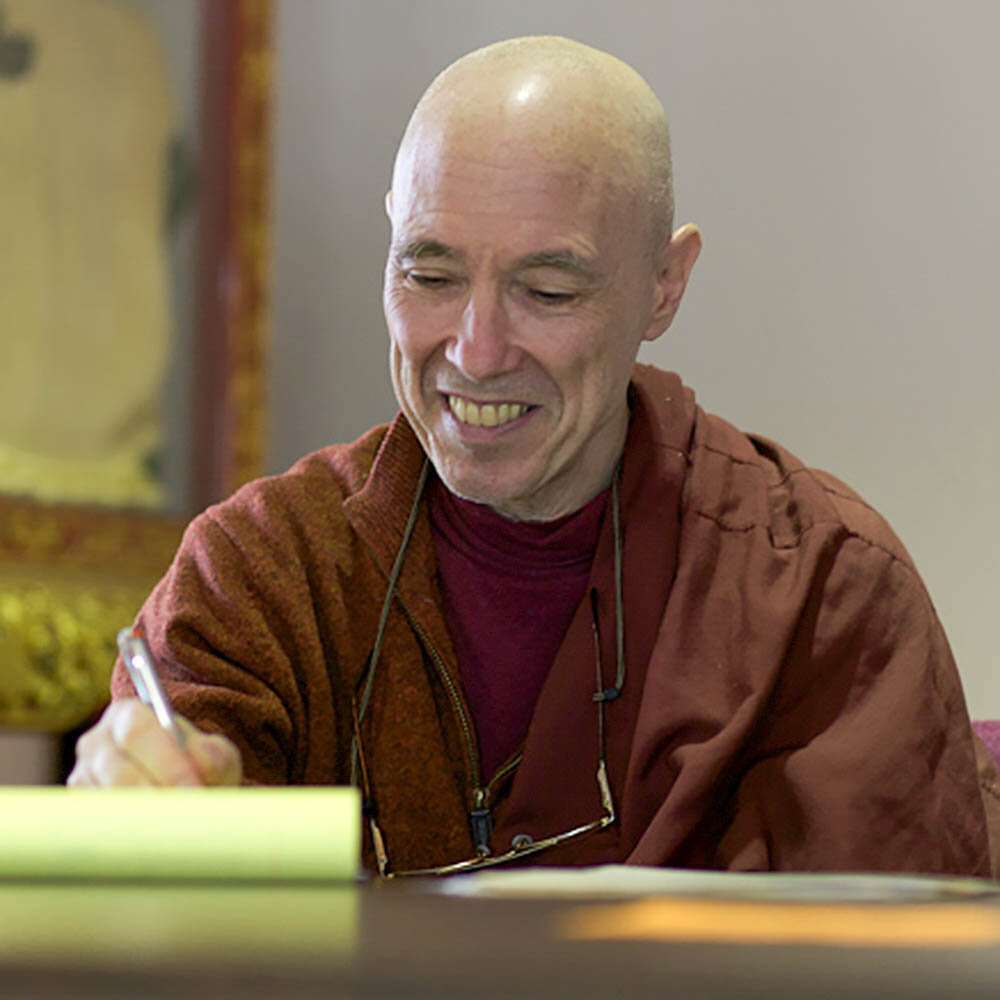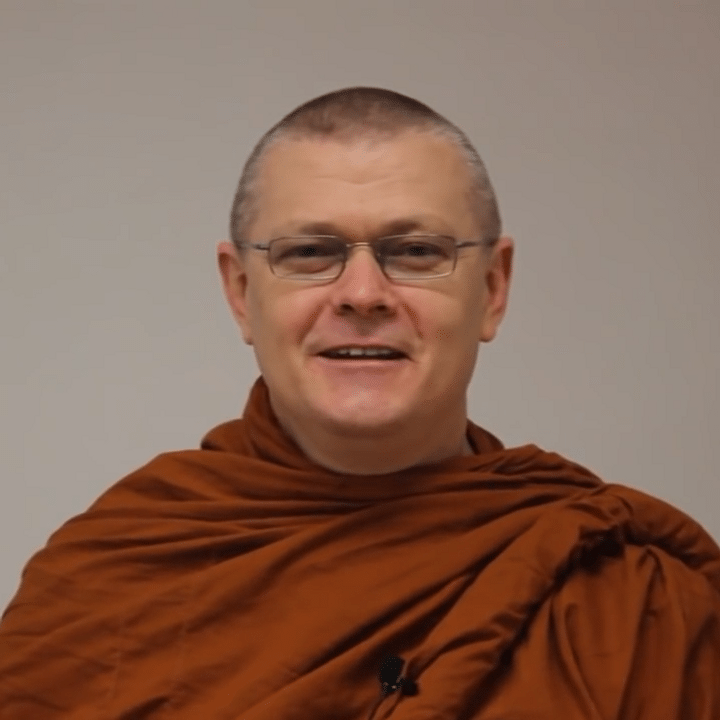Page from manuscript of the commentary on the Majjhima Nikāya, Tham Lanna script, from Wat Lai Hin Luang, Lampang, Thailand c. 1533 CE (CS era 895).
Our goal is to complete the English translation of the Pali Canon and Commentaries, and make the entire Pali Canon and Commentaries freely available online and easily searchable.
Thanks to a supporter’s generosity, the Dīgha Nikāya Commentary (Sumaṅgalavilāsinī) translation is nearly finished. You can view completed parts of the translation here.
Full details on the next stages of the project are available from info@palitranslation.org

To view our Pitch Deck please visit here and click on Show Presentation
The Pali Canon
Despite heroic efforts from many great translators over more than 140 years, the Buddhist Pali Canon has never been fully translated into English, though it is relatively close to being completed. However, many translations are either not available freely online, in keeping with the spirit of freely given teachings, or they are in facsimile form of printed texts, not easily searchable online. Some translations are also of poor quality and contain numerous errors.
The Commentaries
There is a vast and important Pali commentarial tradition augmenting the Pali Canon, but it also has never fully been translated into English.
The Dream
We will complete the full translation of the Pali Canon and Commentaries, combine these with the open-source, freely available translations already available, and make the entire completed work freely available online and freely searchable, such that, at long last, it is all available in its entirety for all future generations. We will do this in collaboration with Sutta Central.
Historical Significance
Just as the King James version of the Bible finally made the entire key text of Christianity available to the English speaking world, just so this project will complete work that has been ongoing over more than a century, like a final relay race runner crossing a historical finish line. We are indebted and profoundly grateful to all the translators who have worked so hard to get us this close and all the generous patrons who have supported their work. This project and those who made it possible will hopefully be remembered for hundreds of years as the project that completed a truly historic milestone in the history of religious literature.
What this will take
The remaining texts to be translated number approximately 10,000 pages in Pali. Additionally, approximately 10,000 pages will need a mix of retranslation and corrections, as the original translations are of insufficient quality for this project. We believe their translation, editing, assurance of quality, typesetting, and online publication will require approximately £5 million/$7.3 million, about 20 translators, and about 10-15 years. Works will be made available as the work is accomplished.
The project has launched and the next stage, the translation of the Majjhima Nikāya Commentary (Papañcasūdanī), requires approximately £400,000 for a three year project.
Help Finish the Job
While we already have a significant team of accomplished translators, we need more to accomplish this in reasonable time and still do high quality work. If you are a skilled Pali Translator interested in helping with this historic project, please contact us.
In the spirit of dana, if you have the resources to financially support this non-profit work, please contact us.
Texts to be Translated
Khuddaka Nikāya
Mahāniddesa & Cūḷaniddesa ~860 pages
Abhidhamma
Dhammasaṅgaṇī: final 2 section
Yamaka (all of it) 529 pages
Paṭṭhāna: 2.1f ~697 pages
Commentaries
Dīgha Nikāya Commentary (Sumaṅgalavilāsinī) 1036 pages - in progress!
Majjhima Nikāya Commentary (Papañcasūdanī) 1528 pages
Saṃyutta Nikāya Commentary (Sāratthapakāsinī) 1069 pages
Aṅguttara Nikāya Commentary (Manorathapūraṇī) 1568 pages
Vinaya Commentary (Samantapāsādikā) 1416 pages
Niddesa Commentary (Saddhammapajotikā) 471 pages
Cariyāpiṭaka Commentary (Paramatthadīpanī VII) 335 pages
Paṭisambhiddāmagga Commentary (Saddhammapakāsinī) 704 pages
Apadāna Commentary (Visuddhajanavilāsinī) 572 pages
Theragāthā Commentary (Paramatthadīpanī V) 739 pages
Total to Translate: ~10298 pages
Texts already translated but not on Sutta Central
Khuddaka Nīkāya
Buddhavaṃsa & Cariyāpiṭaka 140 pages
Abhidhamma
Yamaka 593 pages
Paṭṭhāna ~697 pages
Canonical/Commentary
Jātakas (part of Khuddaka Nikāya) 3111 pages
Dhammapada Commentary 1458 pages
Commentaries
Sutta-nipāta Commentary (Paramatthajotikā II) 608 pages
Udana, Itivuttaka, Vimanavatthu, Petavatthu Commentary (Paramatthadīpanī I-IV) 1452 pages
Therīgāthā Commentary (Paramatthadīpanī V) 273 pages
Buddhavamsa Commentary (Madhuratthavilāsinī) 300 pages
Dhammasangaṇī Commentary (Atthasālinī) 431 pages
Kathāvatthu, Yamaka, Paṭṭhāna Commentary (Pañcappakaraṇa-aṭṭhakathā) 561 pages
Total to make Accurately Available: ~9624 pages
The Team
Oxford Centre for Buddhist Studies
The OCBS is approaching its 20th anniversary. During this time, it has established itself as a trusted academic organisation. In the last ten years, under the Directorship of Richard Gombrich (now retired), the OCBS has vastly expanded its online Pali teaching activities. These currently include: Online comprehensive self-paced Pali courses, live Pali reading groups, an Advanced Pali course, and the Pali Hub -comprising a bibliography (currently over 14,000 entries) of scholarship in Pali and Early Buddhism.
Sutta Central
SuttaCentral contains early Buddhist texts, known as the Tipiṭaka or “Three Baskets”. This is a large collection of teachings attributed to the Buddha or his earliest disciples, who were teaching in India around 2500 years ago. They are regarded as sacred canon in all schools of Buddhism. Here is Sutta Centra’s site for the Pali Translation Project.
There are several Buddhist traditions, and each has passed down a set of scriptures from ancient times. SuttaCentral is specially focused on the scriptures of the earliest period of Buddhism, and hosts texts in over thirty languages. We believe this is the largest collection of early Buddhist texts ever made.
SuttaCentral hosts the texts in orginal languages, translations in modern languages, and extensive sets of parallels that show the relationship between them all.
-

Dr. Richard Gombrich
SENIOR DIRECTOR
Richard Gombrich will oversee the Pali Translation Project. He is a Boden Professor of Sanskrit Emeritus, chairs the Oxford Centre for Buddhist Studies Trustee Board. He also serves as Academic Director of the Centre pro bono.
-

Dr. Alex Wynne
DIRECTOR
Alex Wynne is an accomplished Pali translator and scholar. He will help oversee the Pali Translation Project.
-

Dr. Alastair Gornall
TRANSLATOR
Alastair Gornall researches the intellectual history of Theravada Buddhism and is an expert on post-canonical Pali literature. He has written several articles on the Pali scholastic tradition and is the author of Rewriting Buddhism: Pali Literature and Monastic Reform in Sri Lanka, 1157–1270 (2020). He gained his Ph.D. in South Asian Studies from the University of Cambridge in 2013. He is currently an Assistant Professor in South and Southeast Asian Studies at the Singapore University of Technology and Design and a Research Associate in the School of Language, Cultures, and Linguistics at SOAS, University of London.
-

Dr. Aleix Ruiz-Falqués
TRANSLATOR
Aleix Ruiz-Falqués is a lecturer and researcher in Pali Philology at the Shan State Buddhist University in Taunggyi, Burma (Myanmar). His work focuses on the Pali grammatical and scholastic tradition of Burma. He gained his Ph.D. in South Asian Studies from the University of Cambridge in 2016. He has published several articles on Pali traditional grammar and philology (recently "Boundaries and Domains: Understanding Optionality in Buddhappiya's Rūpasiddhi", Journal of the Pali Text Society XXXIV, 2021). He is currently revising his first monograph: Guṇasāgara's Mukhamattasāra and the Early Pali Scholarship of Burma (Pune Indological Series, forthcoming).
-

Dr. Bhikkhu Bodhi
EDITOR AND TRANSLATOR
Ven. Bhikkhu Bodhi is an American Buddhist monk. He holds a PhD in philosophy from Claremont Graduate University (1972). After completing his university studies, he traveled to Sri Lanka, where he received novice ordination in 1972 and full ordination in 1973. Ven. Bodhi has many important publications to his credit, either as author, translator, or editor. His most recent publication is Reading the Buddha's Discourses in Pali: A Practical Guide to the Language of the Ancient Buddhist Canon (Wisdom Publications, Boston, 2020). He lives and teaches at Chuang Yen Monastery in upstate New York.
-

Bhikkhu Sujato
EDITOR AND TRANSATOR
Bhante Sujato is an Australian Buddhist monk. In 2005 he founded the Buddhist website SuttaCentral along with Rod Bucknell and John Kelly, to provide access to early Buddhist texts in their original language and make translations available in modern languages. Between 2015 to 2018 he translated the four main Pali nikayas into English.
-

Bhikkhu Indriya
TRANSLATOR
Bhikkhu Indriya, a native of India, received his initial training in Pāli at the Vipassanā Research Institute, Mumbai, when he was still a layman. He was ordained as a Theravāda monk in Myanmar while pursuing B.A. in Buddha Dhamma at the International Theravāda Buddhist University (ITBMU), Yangon. He then completed an M.A. in Pāli at the Postgraduate Institute of Pāli and Buddhist Studies (PGIPBS) of the University of Kelaniya, Colombo, Sri Lanka. Having studied advanced Pāli under Prof. Richard Gombrich and Dr. Alexander Wynne, he currently conducts training classes on behalf of OCBS for the teachers of University of Mumbai’s Department of Pāli. His areas of interest include Pāli philology, the comparative study of Pāli and Sanskrit traditional grammars, and Indo-European linguistics.
Make a donation
The Oxford Centre for Buddhist Studies, which will oversee and coordinate the Pali Translation Project, is a registered charity UK No. 1114960.
